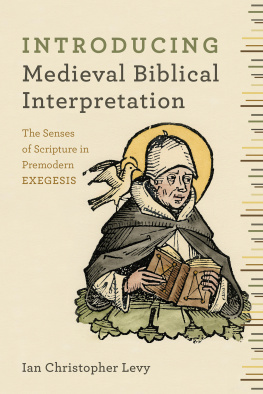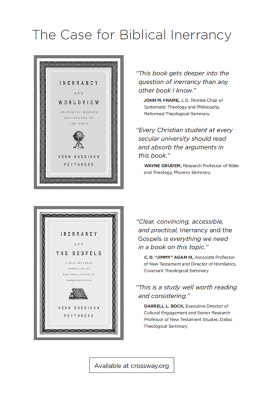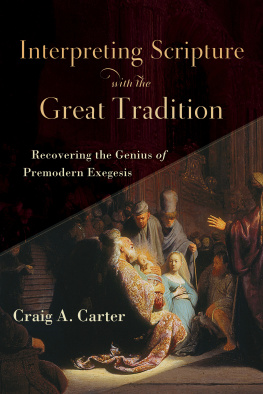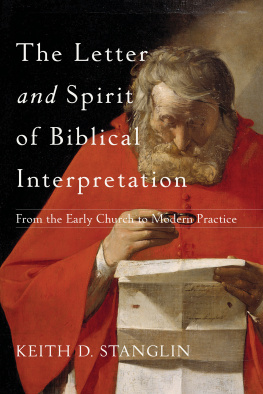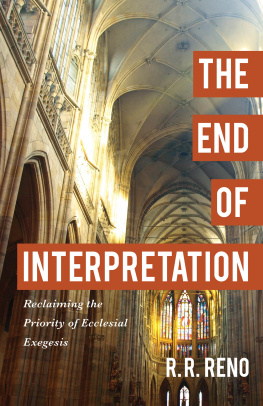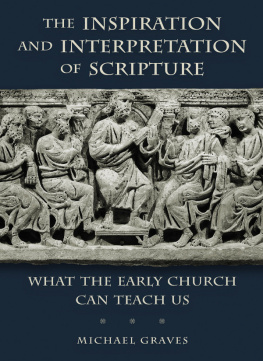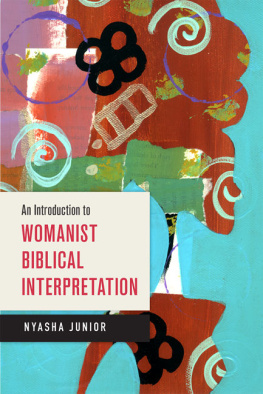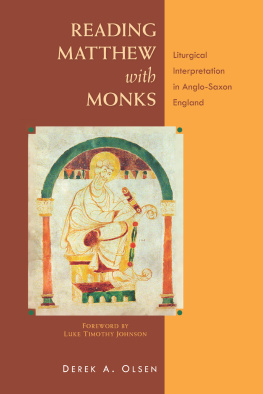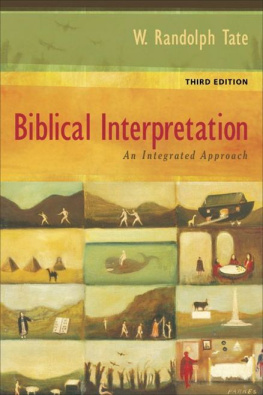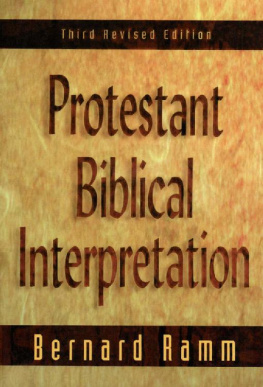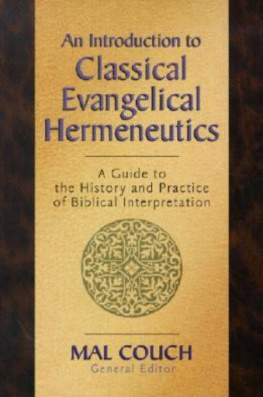Ian Christopher Levy - Introducing Medieval Biblical Interpretation: The Senses of Scripture in Premodern Exegesis
Here you can read online Ian Christopher Levy - Introducing Medieval Biblical Interpretation: The Senses of Scripture in Premodern Exegesis full text of the book (entire story) in english for free. Download pdf and epub, get meaning, cover and reviews about this ebook. year: 2018, publisher: Baker Publishing Group, genre: Religion. Description of the work, (preface) as well as reviews are available. Best literature library LitArk.com created for fans of good reading and offers a wide selection of genres:
Romance novel
Science fiction
Adventure
Detective
Science
History
Home and family
Prose
Art
Politics
Computer
Non-fiction
Religion
Business
Children
Humor
Choose a favorite category and find really read worthwhile books. Enjoy immersion in the world of imagination, feel the emotions of the characters or learn something new for yourself, make an fascinating discovery.
- Book:Introducing Medieval Biblical Interpretation: The Senses of Scripture in Premodern Exegesis
- Author:
- Publisher:Baker Publishing Group
- Genre:
- Year:2018
- Rating:4 / 5
- Favourites:Add to favourites
- Your mark:
- 80
- 1
- 2
- 3
- 4
- 5
Introducing Medieval Biblical Interpretation: The Senses of Scripture in Premodern Exegesis: summary, description and annotation
We offer to read an annotation, description, summary or preface (depends on what the author of the book "Introducing Medieval Biblical Interpretation: The Senses of Scripture in Premodern Exegesis" wrote himself). If you haven't found the necessary information about the book — write in the comments, we will try to find it.
Ian Christopher Levy: author's other books
Who wrote Introducing Medieval Biblical Interpretation: The Senses of Scripture in Premodern Exegesis? Find out the surname, the name of the author of the book and a list of all author's works by series.
Introducing Medieval Biblical Interpretation: The Senses of Scripture in Premodern Exegesis — read online for free the complete book (whole text) full work
Below is the text of the book, divided by pages. System saving the place of the last page read, allows you to conveniently read the book "Introducing Medieval Biblical Interpretation: The Senses of Scripture in Premodern Exegesis" online for free, without having to search again every time where you left off. Put a bookmark, and you can go to the page where you finished reading at any time.
Font size:
Interval:
Bookmark:
2018 by Ian Christopher Levy
Published by Baker Academic
a division of Baker Publishing Group
PO Box 6287, Grand Rapids, MI 49516-6287
www.bakeracademic.com
Ebook edition created 2018
All rights reserved. No part of this publication may be reproduced, stored in a retrieval system, or transmitted in any form or by any meansfor example, electronic, photocopy, recordingwithout the prior written permission of the publisher. The only exception is brief quotations in printed reviews.
Library of Congress Cataloging-in-Publication Data is on file at the Library of Congress, Washington, DC.
ISBN 978-1-4934-1301-0
Unless otherwise indicated, all translations of primary source material are the authors.
Introducing Medieval Biblical Interpretation wrestles patiently with the problem of explaining the methods that medieval Christian exegetes brought to their reading of the Scriptures. Simultaneously a work of rigorous intellectual history and a handbook for recovering a lost way of reading, this book offers close readings of selected interpretive examples from across both the monastic and scholastic tradition, paying special attention to the interpretation of the letters of Paul. Those new to the tradition will find a book packed with insight into the way medieval exegetes read according to both the letter and the spirit. Scholars of medieval exegesis will find a concise introduction to a complex and still underused repertoire of well-chosen texts.
Rachel Fulton Brown , author of Mary and the Art of Prayer: The Hours of the Virgin in Medieval Christian Life and Thought
Levy takes the reader through the fascinating world of eight centuries of medieval exegesis. His masterful selection of texts and authors allows the story to be told by the original voices. Paraphrasing important parts of medieval commentaries, Levy navigates us securely through a wealth of texts, figures, and information. He shows exegetical methods, explains hermeneutical concepts, and grants access to the workshops of medieval exegetes. The book is a welcome guide not only for students but also for any advanced reader with an interest in biblical exegesis. Last but not least, it supports the new awareness in contemporary exegesis of tradition, intertextuality, and the manifold dynamics of biblical texts.
Thomas Prgl , University of Vienna
With crisp writing and clear organization, Levy walks readers through the ancient and medieval centuries of biblical interpretation. He lets the medieval voices speak for themselves through ample selections from primary source material, which makes this volume especially suited for classroom use. Pointing out that biblical scholars married faith and reasonthough not always in balanceLevy displays how the Bible has been interpreted and reinterpreted in different cultural, intellectual, and chronological contexts. It is the proverbial one book youd place in someones hand.
Christopher M. Bellitto , Kean University
Levy writes of the Venerable Bede, Bede admits that while it is true that many before him have commented on [the book of Genesis], such works might prove too difficult for most readers and complete editions too expensive. He would summarize them, therefore, taking what could be most useful to non-experts. What Bede did for eighth-century readers Levy has done for twenty-first-century readerstaken a vast amount of information that is often available only to the specialist and made it easily and enjoyably accessible to nonexperts. For those unfamiliar with medieval biblical interpretation, this volume is a readable yet rich introduction to the topic. It lays out the broad trajectory of medieval biblical interpretation and demonstrates its relevance for the Christian church today.
Greg Peters , Torrey Honors Institute, Biola University
With discriminating erudition as deep as it is wide and unfailing clarity of exposition, Levy covers the sweep of Western Christian biblical exegesis from the church fathers to the fifteenth century. As he shows, whether as monks, pastors, or masters in the schools, medieval exegetes had more in common than has sometimes been imagined. To one degree or another, they all drew on multilevel and intertextual exegesis as well as on the secular learning at their command. And while they all accepted the divine inspiration of the text and the authority of earlier commentators, they also took seriously their right and duty to draw selectively on scriptural texts and traditions along with their personal insights in applying the Bible to their own situational, devotional, pedagogical, and polemical agendas. Levys book provides a rich banquet for both specialist and nonspecialist readers interested in the history of biblical exegesis and offers food for thought for scholars currently engaged in biblical study.
Marcia L. Colish , Oberlin College; visiting fellow in history, Yale University
In memory of my father,
Alan M. Levy
Cover
Title Page
Copyright Page
Endorsement
Dedication
Preface
Abbreviations
Introduction
1. The Age of the Fathers
2. The Early Middle Ages
3. The Schools of the Eleventh Century: From Bec to Reims
4. The Monks of the Twelfth Century
5. The School of St. Victor
6. The Schools of the Twelfth Century: From Laon to Paris
7. Exegesis in the Universities of the Later Middle Ages
8. Applied Exegesis: The New Testament and the Medieval Papacy
Conclusion: Can Medieval Exegesis Speak to Us Today?
Index of Scripture and Other Ancient and Medieval Sources
Index of Modern Authors
Index of Subjects
Back Cover
A great deal of work has been done in the field of medieval biblical hermeneutics over the past eighty years since Beryl Smalley first published her pathbreaking Study of the Bible in the Middle Ages . There is, of course, Henri de Lubacs multivolume Exgse mdivale to consider, and more recently the prodigious scholarship of Gilbert Dahan, principally exemplified by his L exgse chrtienne de la Bible en Occident mdival . This is only the tip of the iceberg, though, as one could go on for pages recounting the work of many eminent scholars. Thus when I agreed to take on the task of writing this volume for Baker Academic Press, it all seemed a bit overwhelming. It was not clear to me at first how I could get a handle on the vast amounts of primary and secondary material so as to produce a coherent account. My fears were gradually allayed, however, as I found that the durable threads that run through the centuries would lead me along from one exegete to another and from one theme to the next. The continuity inherent in this sacred tradition proved to be an internal guide.
In many ways I have followed a conventional path in structuring the book, which moves in orderly fashion across the centuries, with some periods given more attention than others. For the most part, I devote sections within chapters to particular exegetes who best exemplify some period or genre of exegesis. An attempt, moreover, has been made to display the active work of the medieval exegetes, to let them speak for themselves with minimal interference. If I have succeeded, the diligent reader of this volume will have ingested a good deal of medieval biblical exegesis. This is a modest book, perhaps, but it is thick with primary material, the translations of which are my own unless otherwise indicated.
It would have been impossible to begin, let alone complete, the present volume if one did not also rely on the efforts of modern scholars whose facility with the sources is both staggering and inspiring. Like Bernard of Chartres, I too was able to stand on the shoulders of giants even if I could not do full justice to all that I have learned from them. I remain grateful for the assistance of these scholars, some of whom I have been able to consult personally and to work with in other projects over the years. To name just a few: Marcia Colish, Boyd Coolman, Franklin Harkins, Philip Krey, Frans van Liere, Thomas Prgl, and Thomas Ryan. When this book had reached the stage of near-final draft, I sent it to David Nelson, the editor at Baker Academic who has been overseeing the project. He took the time to read it all very carefully and offer valuable comments. I am thankful to him for all of his encouragement, guidance, and dedication. Warm thanks are owed also to Wells Turner and the entire team at Baker for their excellent work in bringing this volume to press. Last, I want to express my gratitude to my wife, Michelle, for her consistent support throughout this and so many other endeavors.
Font size:
Interval:
Bookmark:
Similar books «Introducing Medieval Biblical Interpretation: The Senses of Scripture in Premodern Exegesis»
Look at similar books to Introducing Medieval Biblical Interpretation: The Senses of Scripture in Premodern Exegesis. We have selected literature similar in name and meaning in the hope of providing readers with more options to find new, interesting, not yet read works.
Discussion, reviews of the book Introducing Medieval Biblical Interpretation: The Senses of Scripture in Premodern Exegesis and just readers' own opinions. Leave your comments, write what you think about the work, its meaning or the main characters. Specify what exactly you liked and what you didn't like, and why you think so.

